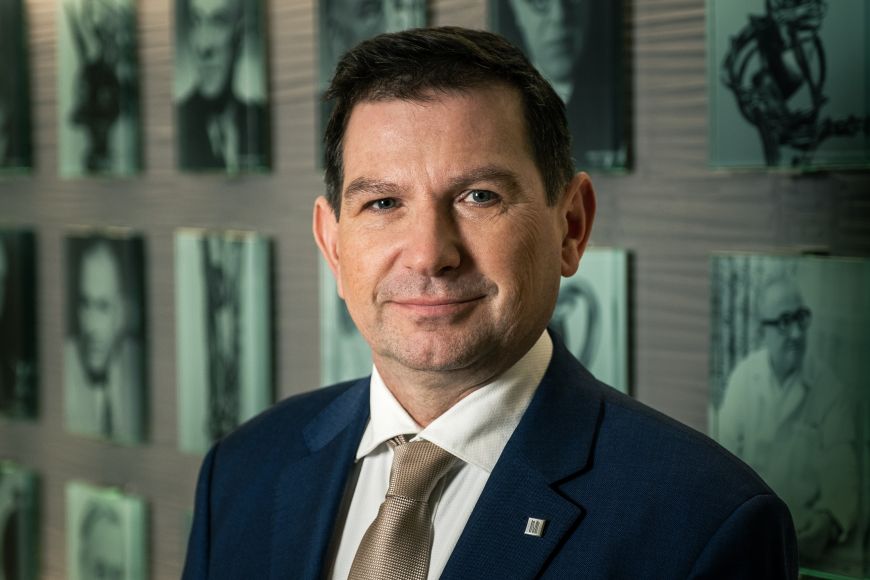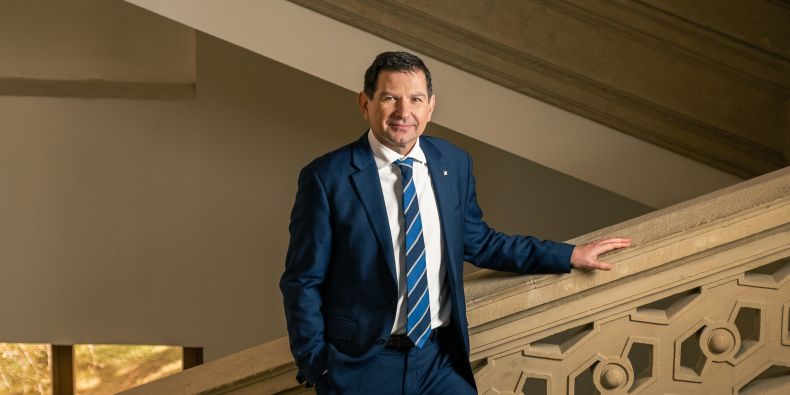How would you describe your current term of office?
As highly turbulent. When I assumed office on 1 September 2019, I had certain ideas on how to lead and develop the University, but it is not for nothing that they say that one changes one’s mind and one’s life. At that time, none of us could have imagined that a pandemic would come and paralyse the entire world for two years. And certainly, none of us at that time imagined that just a few hundred kilometres away, the biggest war in Europe since World War II would break out with hundreds of thousands of refugees. Or that there would be an energy crisis, with prices rising by hundreds of percent and inflation hitting the 20 percent mark.
What was the hardest part?
All these crises have one thing in common – the lack of guidance on how to solve them. None of us has ever experienced a global pandemic with mandated lockdowns, mandatory respirators, a ban on travel between districts, and the like. It is similar to war and all its consequences, but World War II ended almost eighty years ago. As a university rector, everyone expects you to find solutions in such situations. And they expect solutions that are quick and good, and if possible comfortable and painless for everyone. Which is a difficult task.
How does the leader of an institution of nearly 40,000 people react when he finds that there is no manual, and he has to deal with problems he has never encountered in his life?
You have no choice but to roll up your sleeves and get to work. And put in all your energy, effort, and time – and that includes your personal time. In a crisis management situation, you cannot look at working hours, which of course applies to most senior people within the university’s management team. Take the example of a pandemic and remember that at the beginning there was insufficient information about the virus and its lethality, and basic things like masks, respirators, disinfectants, vaccines and medicines were not available at all. The emptiness of the streets resembled being in an apocalyptic film. And in such conditions three years ago, for example, the MU Volunteer Centre, also known as “MUNI HELPS”, was being established and the entire university was going online on a scale none of us had ever experienced.
Has your personal professional experience as a neurologist helped you in crisis management in any way?
Absolutely. At least in the fact that as a doctor you must be able to make decisions – and make them quickly and correctly and often in situations that do not offer only simple and good solutions. Moreover, as a physician, you must first and foremost prioritise the health and needs of the patient. I feel the same is true for me as Rector – I have always tried to put the needs of the University and the people who study or work there first. But I could not have done it without the support of those closest to me, not just colleagues but especially my family. And for that, I would like to thank them, my wife most of all.
One of the classic lessons associated with crises is that every crisis is also an opportunity. Has the coronavirus crisis helped Masaryk University in any way?
It was a big stress test, and it accelerated many things. While some processes would normally take months or years, during the crisis, solutions had to be found and implemented within days, or weeks at most. The pandemic also showed how many capable and exceptional people work in our university – people who do not look out for their personal comfort but are willing to offer their knowledge, experience, and skills in the service of the university. Just the way the entire university was able to go online was an impressive feat. For my part, however, I would probably highlight one thing in particular.
What is it?
The pandemic helped Masaryk University find its social role. At any time – and in major crises like a pandemic or war especially – there are many people who need some form of help. That is also why I am extremely glad for the establishment of the MU Volunteer Centre. Its volunteers and collaborators, of which we now register several thousand, helped during the pandemic and then, for example, after the tornado in South Moravia. Later, of course, they provided assistance after the outbreak of war in Ukraine. The attitude of all these people and the energy they put into selflessly helping others is so inspiring that in its short existence, our volunteer centre has already won two international awards, namely the European Citizen Award and the European Association for International Education Award. These are the moments when working for Masaryk University fills me with pride and a sense of purpose.

How has the war in Ukraine affected the University?
Even though there is no shooting here, its impact is of course very fundamental, similar to the Covid crisis. We were the first university in the Czech Republic and one of the first in Europe to immediately cut all ties with Russian institutions and we began to help Ukrainian refugees among students, academics and their relatives by providing accommodation, interpreting, psychological, financial and material assistance, opening an emergency admission procedure and offering jobs to Ukrainian academics and non-teaching staff. This assistance continues to this day, whether in the form of Czech language courses to facilitate the adaptation of Ukrainians in Czechia, tutoring, babysitting and other activities.
Do you have any idea how many people from Ukraine Masaryk University have actively helped?
Before the war, we had about 200 Ukrainian students. Today there are almost 700, more than 400 of them with refugee status. To this, we should add over 120 Ukrainian teachers, scientists, and even workers who were forced to leave their homes because of the war and found a safe haven at Masaryk University. For example, the MU Career Centre organised a series of workshops for them, where experts advised them on how to successfully integrate into their studies or the labour market. In addition, we also co-organised admission exams to Ukrainian universities in the summer for about 1,500 Ukrainian applicants currently living in the Czech Republic.
What difficulties have the war in Ukraine brought to the university itself?
We all feel the consequences of the war in Ukraine. Not only in the form of high energy prices, which have risen by 280% since 2019, but also inflation which has increased the prices of virtually all services, goods, and raw materials. Further increases are to be expected this year. It is for these reasons, for example, that at the beginning of the current academic year, we have embarked on a more energy-efficient operation of the University and on savings to be able to withstand these difficult times, which in themselves bring additional challenges.
You mentioned other challenges, what are they?
It was only a few years back when the University’s halls of residence were not fully occupied and we had enough accommodation capacity for prospective students. Now our accommodation facilities are virtually fully occupied, and we would obviously need much higher capacity because we are registering a high overhang of demand from students. At the same time, we are trying to renovate the halls of residence, because this problem has not been adequately addressed for many years, also due to lower student interest. That is why I am pleased that, after the financial losses of tens of millions of crowns that we suffered in accommodation during the Covid-19 pandemic, we are managing to renovate the halls of residence in parallel. After the complete reconstruction of the dormitory on Vinařská Street, the Mánes dormitory will be next this year, and a complete reconstruction of the Kounicova dormitory is also planned. In total, the investment amounts to several hundred million Czech crowns. In addition, we plan to increase our dormitory capacity in the future with a completely new complex in the university campus area.
What are you proud of that Masaryk University has achieved during your first term in office?
I find it almost unbelievable that despite all the objective difficulties of the times, we have still managed to maintain a pro-growth budget for the University, which means that everyone has a job and that we have been able to increase scholarships for PhD students, for example. But personally, I am perhaps even more pleased about things that have an international reach and whose contribution, I believe, will be appreciated after some time.
Which things do you mean?
First of all, for the first time in its history, Masaryk University has been ranked among the top 500 world universities in the international ARWU ranking. Furthermore, we managed to receive eleven ERC grants. After 60 long years, we managed to bring the Faculty of Pharmacy back to the fold and the student associations have a new Society Hall on Komenského náměstí. We also participate in the National Recovery Plan, we run SYRI (National Institute for Research on the Socioeconomic Impact of Disease and Systemic Risk), and we have managed to put into operation the most modern Simulation Centre in Europe. We have secured a commitment that another strategic project, MUNI BioPharma Hub, will be implemented, which will bring together modern teaching facilities for the Faculty of Pharmacy, state-of-the-art research infrastructures of the preclinical centre and the Centre for Molecular Medicine of Masaryk University. There are also plans for a science and technology park and the construction of a sports hall to meet the needs of the Faculty of Sports Studies. We have established the post of the university ombudsman. I dare say that despite all the problems of the past and present, a great deal of work has been accomplished for the benefit of Masaryk University, its reputation and its further development.
